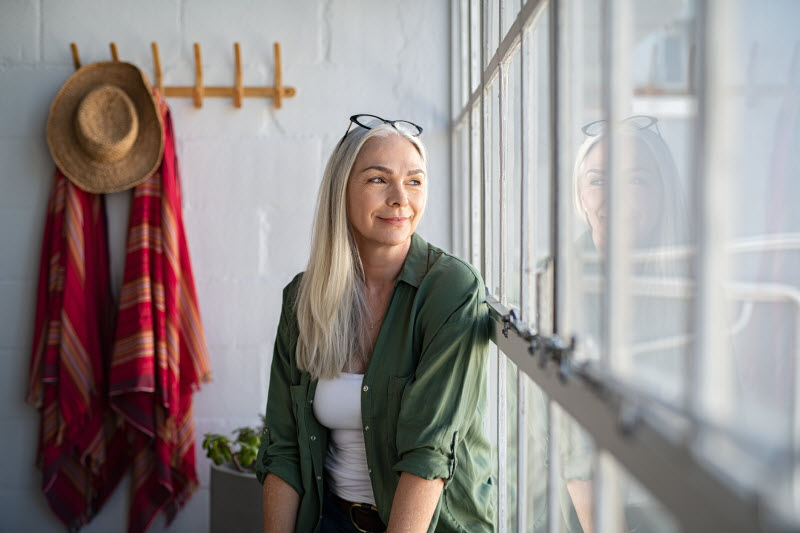[vc_row][vc_column][vc_column_text]Between
climate anxiety, political turmoil, pandemic weirdness, abortion rights, personal life, work pressures and a world in crisis, it can take all of one’s reserves to simply stay afloat. But all the volatility and uncertainty does take an emotional toll. Here’s how to assess your inner signals, avoid
burnout and refill your cup.

Emotional health questions to ask yourself:
Is my mood consistently low?
In certain circumstances, you can legitimately blame your mood on external factors, such as loss of a loved one, work stress or illness. In some ways, an obvious external cause makes treating the issue easier, because as at least you can articulate why you feel sad. But low mood can also happen for more subtle reasons, such as the feeling of languishing, which became more ubiquitous during the pandemic.
In a New York Times article, Adam Grant, an organizational psychologist and bestselling author who studies how people find motivation and meaning, wrote “Languishing is the neglected middle child of mental health. It’s the void between depression and flourishing — the absence of well-being.”
A modern term for the blahs, a generalized dulling of emotions, languishing can be an early indicator of a major depression or anxiety disorder to come. Languishing indicates a slippery slope: You become more and more indifferent, and then dangerously blind to your own indifference.
Try: If you do feel dull and blah, it can help to name the emotion. Articulating the emotion is one of the best strategies for managing it. An even more effective antidote is to find an area that enables flow, the state of absorption where your sense of time and place disappear. Flow is one of the biggest predictors of well-being, so seek out activities in which you feel you are most alive and present.
Do I have hobbies I still enjoy?
A good barometer for emotional health is that you are finding pleasure in the things you have usually found pleasurable. If nothing sounds fun anymore, you might have legitimate cause for concern.
Anhedonia is the inability to feel pleasure. It's a common symptom of depression as well as other mental health disorders. There are two main types of anhedonia. Social anhedonia is when you don’t want to spend time with other people; physical anhedonia is when you don’t enjoy physical sensations, such as favorite foods, or music, as much as you used to.
Try: If you don’t know why you have no oomph, it might be the perfect conditions to try out talk therapy. Having an experienced sounding board can bring the anhedonia into focus and take steps to make the changes that bring back a finely felt sense of pleasure.
Am I getting enough sleep?
There’s a very close relationship between poor
sleep and mental health issues. According to John Hopkins Medicine, “People with insomnia, for example, may have a tenfold higher risk of developing depression than people who get a good night’s sleep. And among people with depression, 75 percent have trouble falling asleep or staying asleep.” Cleaning up your
sleep hygiene can make a huge difference in your emotional outlook.
Try: People tend to focus on their sleep wind down routine, but equally important is how you wake up. If you start your day with alerting behaviors such as a splash of cold water or some energizing exercise, however brief, it cues your
circadian rhythm early on. Then when it’s time to wind down, your circadian rhythm knows exactly what to do.
How connected do I feel to others?
“
Loneliness is the new smoking” is not an understatement. According to the National Institute on Aging, “the health risks of prolonged isolation are equivalent to smoking 15 cigarettes a day. Social isolation and loneliness have even been estimated to shorten a person’s life span by as many as 15 years.” The pandemic exacerbated feelings of isolation and made it much more common to feel that way.
Try: Reconnect with friends or family by reaching out. If you can’t do it in person, schedule a facetime or zoom meeting, or even an old-fashioned phone call. Or you could go double down on the quest to feel connected by
volunteering. It helps you feel less lonely and allows you to have a sense of mission and purpose in life, which is linked to better health.
Am I abusing any substances in order to self-regulate?
Gambling, overeating, drinking alcohol, using tobacco or other drugs, and even compulsive shopping are all potential indicators that your strategies to cope with emotional chaos are not working. The
pandemic has also seen the rise of gray area drinking, a class of drinking in which you experience an over-reliance on alcohol, but do not have severe alcohol use disorder. Gray area drinking is often emotional, and anytime a substance is used for emotional reasons, such as eating, it’s a good time to re-examine your relationship to said substance.
Try: A good start to identifying an addiction is to see how hard it is to take a break. It gives you a good feel for how much bandwidth the substance has over you—and whether you actually feel better without the substance. Then you can make an informed decision about your own rules of engagement or seek help if you feel like the addiction has gotten the better of you.
Whatever the state of your emotional health, it’s better to prioritize it. Emotions have a lot to tell you. Be compassionate with your feelings. Start by asking yourself one simple question: “What do I need right now?”
[/vc_column_text][/vc_column][/vc_row][vc_row][vc_column][vc_text_separator title="Featured Products" border_width="2"][vc_row_inner equal_height="yes" content_placement="middle" gap="35"][vc_column_inner width="1/3"][vc_single_image image="162055" img_size="full" alignment="center" onclick="custom_link" img_link_target="_blank" css=".vc_custom_1661715277672{padding-right: 7% !important;padding-left: 7% !important;}" link="https://www.vitacost.com/nordic-naturals-stress-relief-gummies"][/vc_column_inner][vc_column_inner width="1/3"][vc_single_image image="162053" img_size="full" alignment="center" onclick="custom_link" img_link_target="_blank" css=".vc_custom_1661715296303{padding-right: 7% !important;padding-left: 7% !important;}" link="https://www.vitacost.com/gaia-herbs-emotional-balance"][/vc_column_inner][vc_column_inner width="1/3"][vc_single_image image="162054" img_size="full" alignment="center" onclick="custom_link" img_link_target="_blank" css=".vc_custom_1661715313648{padding-right: 7% !important;padding-left: 7% !important;}" link="https://www.vitacost.com/vitanica-uplift-emotional-support-120-vegetarian-capsules"][/vc_column_inner][/vc_row_inner][/vc_column][/vc_row]




